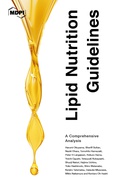Explore

Lipid Nutrition Guidelines
0 Ungluers have
Faved this Work
Login to Fave
Ever since the publication of Ancel Keys’ watershed ‘Seven Countries Study’ in 1970, medical thinking has posited a causal link between the intake of animal fats and coronary heart disease. The research of Prof. Harumi Okuyama and his colleagues presented in this new publication suggests that this link is in fact tenuous. It goes beyond that to suggest that current medical wisdom regarding lipid nutrition may actually be counterproductive. This ground-breaking analysis is likely to be debated for many years to come.
The ‘Seven Countries Study’, which identified the specifics of the Mediterranean Diet and awarded it a central position in combating coronary heart disease, triggered significant changes in Western diets. Most notably, it stimulated a widespread attempt to reduce animal fats and replace them with vegetable fats. The low-density lipoprotein (LDL) element of the cholesterol naturally present in animal-source foods was dubbed a killer, and a significant industry developed around the provision of plant-based oils and fats. The clinical consensus on cholesterol was further strengthened in 1987 by the introduction of statins, an innovative class of drugs that reduce LDL production in the liver and are designed to help guard against coronary heart disease.
Thirteen Nobel Prizes have been awarded to scientists who devoted major parts of their careers to cholesterol research. It is therefore a brave research team that dares to challenge the link between animal fats and coronary heart disease. This, however, is precisely what Prof. Okuyama and his team set out to do in this book. They actually recommend increasing the intake of cholesterol and animal fats, to an extent that does not lead to obesity.
This recommendation is based on the discovery by Prof. Okuyama and his team that common vegetable oils such as canola and hydrogenated vegetable fats have toxic effects. They demonstrate that hydrogenated vegetable fats and oils are important culprits in atherosclerosis and other lifestyle diseases, and suggest that high total or LDL-cholesterol is not the cause of atherosclerosis or cardiovascular disease.
Further, they argue that current medical guidelines on lipid nutrition conflict with evidence-based research, and that persistently focusing on LDL-cholesterol as the cause of atherosclerotic cardiovascular disease (ASCVD) is counterproductive.
Key findings
Some types of vegetable fats and oils exhibit stroke-inducing and endocrine-disrupting activity. Their inhibition of the vitamin K2–osteocalcin link is the major cause of ASCVD and related diseases.
In the current food environment, the balance of omega-6 and omega-3 fatty acids is too much in favour of omega-6, and therefore lowering the omega-6/omega-3 ratio is recommended for the prevention of allergic and inflammatory diseases including ASCVD and cancer.
Atherogenesis can develop without elevated LDL-cholesterol levels and/or in association with decreasing LDL-cholesterol levels.
Increased intake of vegetable fats and oils with stroke-inducing and endocrine-disrupting activities in countries with restricted intakes of animal fats and cholesterol has led to the critical situations surrounding physical and mental health currently seen in Japan, East Asia, and the Mediterranean countries.
Medical care professionals continue to insist on actively reducing LDL-cholesterol levels. This approach will only heighten the extensive health problems that Japan and some countries are at present facing. Many aspects of current medical practice in Japan are indeed likely to be in conflict with that country’s Medical Care Act.
This thought-provoking analysis of one of the major health syndromes of our day demands serious consideration by professionals interested in cardiovascular health in particular and in public health more widely. Its implications are far-reaching – for medical practitioners, medical insurers, nutritionists, food producers and pharmaceutical manufacturers alike, as well as for individual patients.
This book is included in DOAB.
Why read this book? Have your say.
You must be logged in to comment.
Editions

